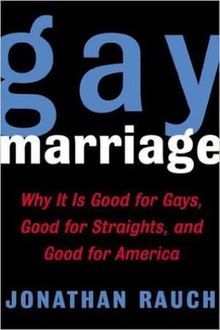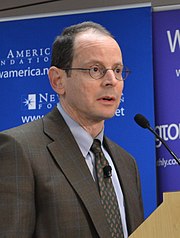| This article includes a list of general references, but it lacks sufficient corresponding inline citations. Please help to improve this article by introducing more precise citations. (February 2021) (Learn how and when to remove this message) |
 Cover of the first edition Cover of the first edition | |
| Author | Jonathan Rauch |
|---|---|
| Language | English |
| Subject | Same-sex marriage |
| Publisher | Times Books |
| Publication date | 2004 |
| Publication place | United States |
| Media type | Print (Hardcover and Paperback) |
| Pages | 207 |
| ISBN | 978-0805078152 |
Gay Marriage: Why It Is Good for Gays, Good for Straights, and Good for America is a 2004 book by the journalist Jonathan Rauch in which the author advocates the legal and social recognition of same-sex marriage.
Background and publication history

Jonathan Rauch is an American journalist. In 2004, he was a correspondent for The Atlantic and a writer in residence at the Brookings Institution, an American think tank. Gay Marriage was his fifth book.
Gay Marriage was first published in April 2004 by Times Books, an imprint of Henry Holt and Company. A paperback edition was issued in 2005 by Owl Books.
Reception
Popular press
Gay Marriage received positive reviews from Emily Bazelon in the Los Angeles Times Book Review, Robyn E. Blumner in the St. Petersburg Times, Anne Crittenden in The American Prospect, John David Dyche in The Courier-Journal, The Economist, the historian David J. Garrow in The Washington Post Book World, Jonathan Kay in the National Post, Kip Keller in the Austin American-Statesman, and Debra Moore in Library Journal; mixed reviews from Christopher Caldwell in The New York Times Book Review and Kay Hymowitz in Commentary; and a negative review from Shawn Macomber in The American Spectator.
Bazelon wrote that Rauch "employs a smart and well-timed strategy by appealing to social conservatives on their own terms". She credited him with showing that the arguments against same-sex marriage were "less than compelling". However, she found his view that the advent of same-sex marriage would bring maturity to gay culture and an end to sexual liberation "disconcerting and a bit sad". Blumner praised Rauch as "today's clearest thinker" on the subject of same-sex marriage. She wrote that the book demonstrated that recognising same-sex marriage would benefit conservatives. Crittenden reviewed Gay Marriage alongside Stephanie Coontz's Marriage, a History. She described Rauch's book as "a reasoned, informed, and passionately persuasive polemic". She commented that Rauch's defense of marriage over "marriage-lite" alternatives had led her to reassess her own support for civil partnerships.
Dyche wrote that Rauch had addressed objections to same-sex marriage with "disciplined logic and unfailing humility". He predicted that the book would have historical significance. A reviewer for The Economist praised Gay Marriage as "a powerful book, clear, tolerant, and persuasive, never ranting or self-pitying". The reviewer credited Rauch with refuting all the arguments against same-sex marriage, and recommended that the book "become obligatory reading for all". Garrow reviewed Gay Marriage alongside David Moats' Civil Wars: A Battle for Gay Marriage. He called Rauch's book "as enthusiastic an encomium to marriage as anyone, gay or straight, could write". He suggested that Rauch was too polite to his opponents, who Garrow believed held "a racist-like loathing of gay people as innately inferior".
Kay remarked that Rauch "takes marriage very, very seriously—far more so, it seems, than most straights". He agreed that recognising same-sex marriage would lead to changes in gay culture—in his view, married gay people would embrace a "boring", "bourgeois" way of life. Keller wrote that Rauch was correct to avoid legalistic, constitution-based arguments, which Keller found generally unconvincing. He commended Rauch's argument that same-sex marriage would benefit society, stating "From now on, any legitimate debate about gay marriage will have to take account of the case Rauch makes here." Moore reviewed Gay Marriage alongside Gerald P. Mallon's Gay Men Choosing Parenthood. She suggested that Rauch had a "remarkably rosy" understanding of marriage and had largely overlooked lesbians. Nevertheless, she recommended Gay Marriage to all libraries, describing it as "a timely and readable book that will provoke people on both sides of the argument".
Caldwell called Gay Marriage "a closely argued new polemic". He credited Rauch with "an appealing combination of prosecutorial logic and gentlemanly forbearance", but wrote that Rauch's comments on polygamy and on the stabilising influence of marriage "do not close any arguments". He believed that Rauch was unreasonable to dismiss the argument that procreation and childrearing were important to marriage. He expressed doubt that the same-sex marriage movement would "shore up" marriage as an institution. Hymowitz wrote that the book was "smart, reasoned, at points affecting", but ultimately unconvincing. She credited Rauch with "a sophisticated grasp of matrimony as an institution that shapes behavior and provides vital social goods", but faulted his treatment of the relation between marriage and children. Macomber found it "fascinatingly counterintuitive" that Rauch would portray himself and the gay community as "the true defenders of marriage". He wrote that Rauch's proposal to introduce same-sex marriage state-by-state, on a trial basis, was inconsistent with Rauch's view of same-sex marriage as a civil right. He believed that Rauch was incorrect to reject the libertarian solution, marriage privatisation.
Gay press
Gay Marriage received positive reviews from Teresa DeCrescenzo in Lesbian News, Edward Olivera in the Lambda Book Report, and the Washington Blade; and a negative review from E. J. Graff in Out.
DeCrescenzo reviewed Gay Marriage alongside Davina Kotulski's Why You Should Give a Damn About Gay Marriage and Moats' Civil Wars, calling Rauch's book "by far the best of the lot". She wrote that Gay Marriage "turns opponents' own conservative arguments on them". Olivera praised the book as "a carefully reasoned polemic". He agreed with Rauch that the recognition of same-sex marriage in the United States should proceed on a state-by-state basis. A reviewer for the Washington Blade described Gay Marriage as a "deft and nimble work", written in a "breezy, detailed yet uncluttered style". The reviewer suggested that Rauch had overlooked the question of marriage portability: whether one state should recognise same-sex marriages contracted in another. Graff accused Rauch of misrepresenting her own book on marriage, What Is Marriage For?. She criticised the argument that same-sex marriage would "domesticate" gay men.
Academic journals
Andrew Lister reviewed Gay Marriage in Polity, the journal of the Northeastern Political Science Association. Lister wrote that he, like Rauch, wished to preserve the special status of civil marriage. Nevertheless, he believed that Rauch had failed to consider how this special status might conflict with the liberal values of "civic equality and individual freedom".
Other evaluations
In April 2004, the American Enterprise Institute hosted a symposium on Gay Marriage featuring Rauch, the philosopher Michael Novak, and the political scientist Charles Murray. Essays by the philosopher Susan M. Shell, Rauch, Novak, and Murray subsequently appeared in the institute's journal, The Public Interest.
References
- ^ Caldwell 2004.
- ^ Washington Blade 2004.
- Contemporary Authors 2006.
- Publishers Weekly 2004; Rauch 2004, p. vi.
- Taylor 2005.
- ^ Bazelon 2004.
- ^ Blumner 2004.
- ^ Crittenden 2005.
- ^ Dyche 2004.
- ^ The Economist 2004.
- ^ Garrow 2004.
- ^ Kay 2004.
- ^ Keller 2004.
- ^ Moore 2004.
- ^ Hymowitz 2004.
- ^ Macomber 2004.
- ^ DeCrescenzo 2004.
- ^ Olivera 2004.
- ^ Graff 2004.
- Lister 2005.
- Book TV 2004.
- Shell 2004.
- Rauch 2004b.
- Novak 2004.
- Murray 2004.
Bibliography
Books
- Rauch, Jonathan 1960–. New Revision Series. Vol. 151. Thomson Gale. 2006. pp. 327–329. ISBN 0-7876-7905-4. ISSN 0275-7176.
{{cite encyclopedia}}:|work=ignored (help) - Rauch, Jonathan (2004). Gay Marriage: Why It Is Good for Gays, Good for Straights, and Good for America (1st ed.). New York: Times Books/Henry Holt and Co. ISBN 0-8050-7633-6.
Periodicals
- Bazelon, Emily (4 April 2004). "Gays growing up and moving on". Los Angeles Times Book Review. p. R5. ISSN 0458-3035. Archived from the original on 20 January 2021.
- Blumner, Robyn E. (23 May 2004). "Columns: Why gay marriage is good for conservatism". St. Petersburg Times. ISSN 2327-9052. Archived from the original on 24 June 2004.
- Caldwell, Christopher (11 April 2004). "Vows". The New York Times Book Review. ISSN 0028-7806.
- Crittenden, Ann (May 2005). "Knot For All". The American Prospect. Vol. 16, no. 5. pp. 38–39. ISSN 1049-7285.
- DeCrescenzo, Teresa (May 2004). "A Look at Books". Lesbian News. Vol. 29, no. 10. p. 37. ISSN 0739-1803.
- Dyche, John David (18 May 2004). "The conservative case for gay marriage". The Courier-Journal. p. A11. ISSN 1930-2177.
- "Gay marriage: Win, win, win?". The Economist. Vol. 371, no. 8369. 3 April 2004. p. 87. ISSN 0013-0613.
- Garrow, David J. (18 April 2004). "Altared States". The Washington Post Book World. ISSN 0190-8286.
- Graff, E. J. (September 2004). "Marriage Matters". Out. Here Publishing. pp. 104, 106, 110. ISSN 1062-7928.
- Hymowitz, Kay (1 June 2004). "I Do?". Commentary. Vol. 117, no. 6. pp. 59–62. ISSN 0010-2601.
- Kay, Jonathan (22 March 2004). "Giving gays the right to be bored". National Post. p. RB10. ISSN 1486-8008.
- Keller, Kip (11 April 2004). "Saying 'I do' for a better society". Austin American-Statesman. pp. K5, K7. ISSN 1553-8451.
- Lawler, Peter Augustine (28 June 2004). "More Than a Contract". National Review. Vol. 56, no. 12. pp. 46–47. ISSN 0028-0038.
- Lister, Andrew (July 2005). "How To Defend (Same-Sex) Marriage". Polity. 37 (3): 409–424. doi:10.1057/palgrave.polity.2300020. S2CID 144318757.
- Macomber, Shawn (16 April 2004). "The World According to Jonathan Rauch". The American Spectator. ISSN 0148-8414.
- Moore, Debra (1 April 2004). "Social Sciences". Library Journal. Vol. 129, no. 6. p. 112. ISSN 0363-0277.
- Muñoz, Vincent Phillip (September 2004). "Here Come the Grooms?". The American Enterprise. Vol. 15, no. 6. pp. 54–55. ISSN 1047-3572. Gale A120908441.
- Murray, Charles (Summer 2004). "Marriage-lite". The Public Interest (153): 31–36. ISSN 0033-3557.
- Nawrocki, Jim (20 May 2004). "In Defense of Gay Marriage". Bay Area Reporter. Vol. 34, no. 21. p. 43. ISSN 2374-264X.
- Novak, Michael (Summer 2004). "What marriage is". The Public Interest (153): 24–30. ISSN 0033-3557.
- Olivera, Edward (June–July 2004). "Civil Disobedience". Lambda Book Report. Vol. 12, no. 11. pp. 16–17. ISSN 1048-9487.
- Olson, Ray (1 March 2004). "Upfront: Advance Reviews". Booklist. Vol. 100, no. 13. p. 1099. ISSN 0006-7385.
- "Nonfiction". Publishers Weekly. Vol. 251, no. 11. 15 March 2004. p. 65. ISSN 0000-0019.
- Rauch, Jonathan (Summer 2004b). "What I learned at AEI". The Public Interest (153): 17–23. ISSN 0033-3557.
- Sacuta, Norm (30 May 2004). "Rauch's view of gay marriage struggle panders to conformity". Edmonton Journal. p. D11. ISSN 0839-296X.
- Shell, Susan M. (Summer 2004). "The liberal case against gay marriage". The Public Interest (153): 3–16. ISSN 0033-3557.
- Sims, Michael (25 April 2004). "Author outlines virtues of gay marriage". The Tennessean. p. D36. ISSN 1053-6590.
- Taylor, Ihsan (17 April 2005). "Paperback Row". The New York Times. ISSN 0362-4331. Retrieved 30 March 2021.
- "Arguing over marriage". Washington Blade. 9 April 2004. ISSN 0278-9892. Archived from the original on 1 June 2004.
- Wolff, Robert W. (February 2005). "Rauch's Reasons". Out in the Mountains. Vol. 20, no. 1. p. 17.
- Woodrow, Marnie (22 May 2004). "When Carol met Alice". The Globe and Mail. ISSN 0319-0714.
- Zane, J. Peder (28 March 2004). "Marriage of our hearts and minds". The News & Observer. ISSN 2688-8807. Archived from the original on 16 August 2004.
Audiovisual media
- Gay Marriage. Book TV (Television production). 15 April 2004. Transcript.